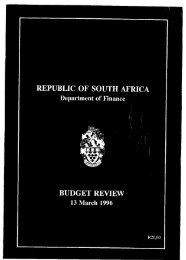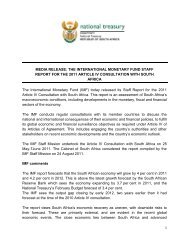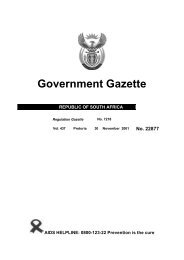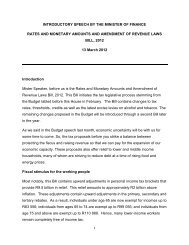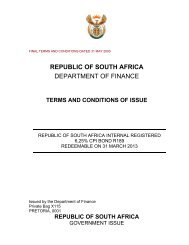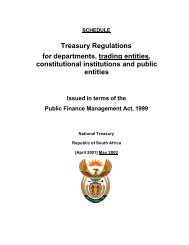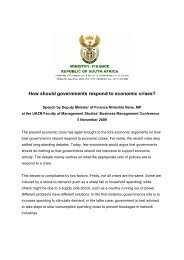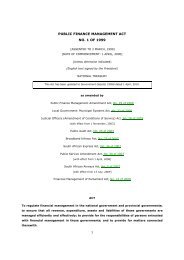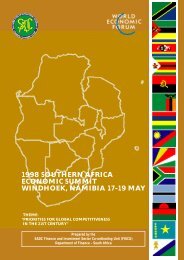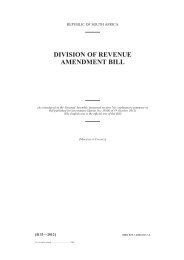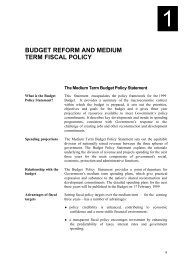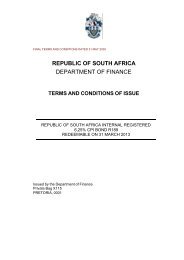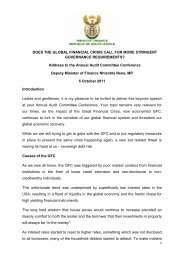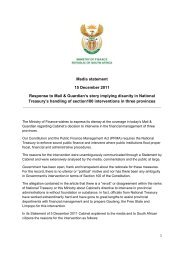Annual Performance Plan Jaarlikse ... - National Treasury
Annual Performance Plan Jaarlikse ... - National Treasury
Annual Performance Plan Jaarlikse ... - National Treasury
You also want an ePaper? Increase the reach of your titles
YUMPU automatically turns print PDFs into web optimized ePapers that Google loves.
• Post Provisioning Norms<br />
The staff establishments of public ordinary schools are annually determined in terms of the post provisioning norms. As<br />
prescribed by legislation, employee parties to the Provincial Education Labour Relations Council (PELRC) as well as the<br />
recognised SGB associations are duly consulted on the overall educator post affordability as well as on the<br />
determination of staff establishments of public ordinary schools.<br />
The Heads of Education Committee (HEDCOM) approved the latest post provisioning norms after changes to the Grade<br />
10 curriculum.<br />
The WCED increased the total number of teaching posts in the province by 500 bringing the total number of educator<br />
posts to 30 872 for 2007.<br />
• School Safety<br />
As is the case elsewhere in the world, school safety is becoming an increasing concern of government. The Western<br />
Cape is particularly plagued in this regard as it experiences the serious problems of gangsterism and gang violence and<br />
the accompanying scourge of alcohol and substance abuse. Together with a range of partners, but in particular the<br />
Department of Community Safety, these issues are being tackled head-on.<br />
The Safe Schools Programme has a three-pronged strategy, which includes the following:<br />
• A Safe Schools Call Centre, where various problems can be reported, and where affected and traumatised<br />
individuals can also request, and receive, counselling<br />
• Provision of physical security: this programme focuses on the installation of various safety measures, including<br />
security fencing and security alarms at high-risk schools. The programme also includes survival strategies.<br />
• Educational programmes focusing on values and attitudes, the goal of which is to re-direct learners’ interests into<br />
more positive pursuits such as sports, arts and drama, and focusing on future careers.<br />
• School governance<br />
• Section 21 schools<br />
A total of 934 out of 1450 schools (or 64,4% of all public ordinary schools) have been awarded full Section 21 (of the<br />
South African Schools Act, 1996 (Act No 84 of 1996) (SASA)) status. The remaining 516 schools are still receiving<br />
ongoing attention. Support to all schools in financial management and administration is being given on an ongoing<br />
basis.<br />
• No-fee schools<br />
In an attempt to curb the rising costs to parents of limited financial means of the education of their children and to<br />
expand the access to education, the SASA was amended to allow for the (national) Minister of Education (MoE) to<br />
determine the national quintiles for public schools that may not charge school fees w.e.f. 01 January 2007.<br />
The MoE determined, and published in Government Gazette No. 29179 dated 31 August 2006, a national target for<br />
2007 that accommodates 40% of learners in the country in ‘no-fee schools’, i.e. schools that fall in <strong>National</strong> Quintiles<br />
(NQ) 1 and 2, w.e.f. 01 January 2007.A list of the schools per province that will not be permitted to charge<br />
compulsory school fees, in terms of this target and as compiled by the MEC for Education in each province, was also<br />
published in the Government Gazette.<br />
Only 6,5% (59 306) of the learners in the Western Cape fall in NQ 1 and 8% (73 254) in NQ 2, i.e. only 14,5% of the<br />
learners in the Western Cape are in the poorest two quintiles nationally (40% of learners in the country).<br />
Since the Western Cape has a low percentage of learners in NQs 1 and 2, compared to all the other provinces, the<br />
WCED decided to also extend the ‘no-fee school’ status to schools in NQ 3 (211 841 learners).As this could not be<br />
done by way of the Government Gazette, it had to be done by means of a voluntary arrangement with the identified<br />
NQ 3 schools. All NQ 3 schools took up this offer and have been declared ‘no- fee schools’ and, therefore, may also<br />
not charge compulsory school fees w.e.f. the 2007 school year.<br />
419 primary schools, covering 146 000 learners, had already declared ‘’no-fee in May 2006 as part of the voluntary<br />
process introduced by provinces in an effort to fast-track the declaring of ‘no-fee’ schools. An amount of R29 million<br />
was allocated to these schools, additional to their original norms and standards allocation, in 2006/07.<br />
<strong>Annual</strong> <strong>Performance</strong> <strong>Plan</strong> 2007/08 – 2009/10<br />
39



